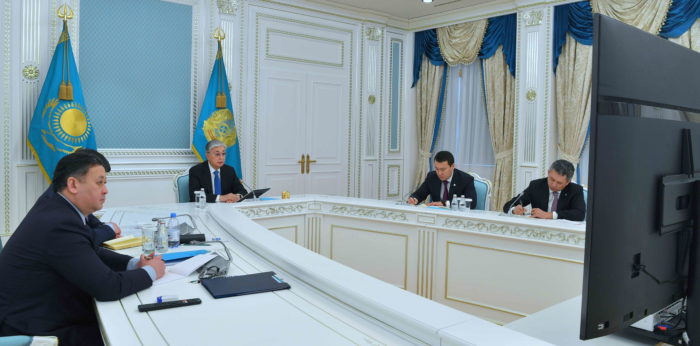The Eurasian Economic Council approved the Eurasian Economic Union (EAEU) macroeconomic policy draft guidelines for 2020 – 2021 on April 29 as reported by the organization’s press service.

Photo credit: Akorda.kz.
The heads of the EAEU member states including the Prime Minister of Armenia Nikol Pashinyan, President of Belarus Alexander Lukashenko, President of Kazakhstan Kassym-Jomart Tokayev, President of Kyrgyzstan Sooronbai Jeenbekov, President of Russia Vladimir Putin agreed on the necessity of creating this document during a virtual online summit held by the Supreme Eurasian Economic Council on April 14. Initiated by President Lukashenko, the working meeting was held to discuss the response efforts and economic situation in the region. If the member states do not join forces, noted Lukashenko, then “it will take time, money and labor to restore broken economic ties.”
Amid the COVID-19 outbreak the council pledged to do what it could to preserve macroeconomic stability and the standard of living achieved in the EAEU states – Armenia, Belarus, Kazakhstan, Kyrgyzstan and Russia. It also proposed measures to minimize the economic consequences of supply shocks due to the pandemic and a sharp decrease in commodity prices.
The governments, central (national) banks of the member states of the EAEU and the Eurasian Economic Commission are set to take coordinated measures to prevent the spread of infection, strengthen economic cooperation, and maintain the stability of food markets as well as support people and businesses in overcoming the negative consequences of a pandemic.
The heads of states affirmed their readiness to maintain the level of integration cooperation achieved and economic development, to ensure social and macroeconomic stability in the region and to prop up business and investment activities.
The countries agreed to continue mutual assistance in strengthening healthcare systems, conducting joint research in the field of developing means for the prevention, diagnosis and treatment of infection diseases, and on improving interaction algorithms in responding to epidemics.
“We are convinced that the fight against the COVID-19 pandemic should not lead to the breakdown of economic ties, the suspension of international trade, and the cessation of investment activity. We urge all states to maintain international cooperation, build confidence, end armed conflicts, trade wars, unilateral financial and economic sanctions and respect international law,” the statement read.
The member states urge for the unity of the international community and the stability of the global economy. It is essential to preserve the principle of freedom of movement of goods, food items, medical equipment and medicines, protective equipment.
Kazakh President Tokayev proposed to strengthen trade, economic, financial, digital interaction and establish cooperation in healthcare and science. Cooperation will boost “food self-sufficiency, increase production for foreign markets and exchange experience in agricultural science,” he said.
Regional production and technological cooperation are also vital. The crisis will change globally value chains and nationalization and regionalization will shape the structure of global production, trade and logistics. “We can develop regional value chains based on the competitive advantages of our economies. The governments can develop and specify this direction of joint work,” said Tokayev.

